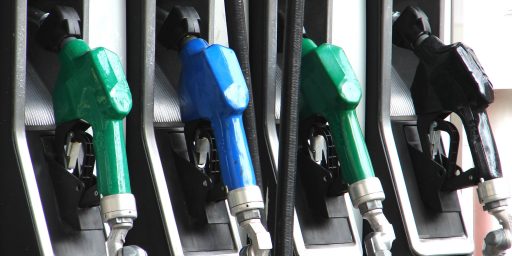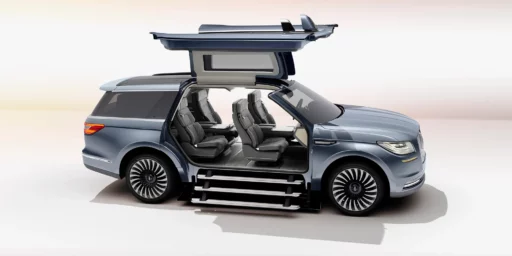How many soldiers-per-gallon does your SUV get?
I find such posts as this one by Andrew Sullivan to be incredibly…well stupid. Are terroristis benefitting from higher oil prices? Probably. Are SUVs to blame? In a marginal and fairly insignificant manner I suppose so. The high oil prices are not a direct result of SUVs. After all SUVs have been around for years and it has only been in the last few years that oil prices have been going up.
Basically I see people who make these arguments and arugments about drilling in ANWR (Sullivan makes this argument too) as people who don’t seem to grasp the concept of a global market. What matters for the price of oil is that the U.S. consumes a large amount of oil (and now other countries are increasing their consumption too while at the same time increasing production is somewhat difficult…hence a rise in the price). Even if we drill in ANWR and start using that oil will it do much to decrease the flow of petrodollars to terrorists? Maybe a little bit, but over all not much. Why? Because drilling in ANWR is going to have only a slight impact on the global price for oil. Would driving economy cars help? Sure, but not all that much either. Oil is used in a wide array of consumer goods not just gasoline. So exactly how much less oil will we consume if we all switch to SUVs? Funny that Sullivan and those who think like him can’t answer that question. Lets see if we can help Andrew out here. Suppose we could go back to 2001 and magically put everybody in an SUV into a passanger car. Further, suppose we could constrain everyone to drive the exact same miles in that passanger car that the drove in their SUV (SUV drivers don’t drive as many miles as people with passanger cars). Now, according to this website that would mean we’d have about 84 million new passanger cars (vs. other 2 axle 4 tire vehicles). These cars would drive on averge 11,140 miles and they’d consume 532 gallons of gasoline vs 633 gallons of gasoline for a net savings of 101 gallons of gasoline. Over all this would reduce gasoline consumption by 8,502,951,236 gallons. How much is that in terms of our overall gasoline consumption for 2001? About 6.7%. That’s right even if we could get every single person out of their pick-up truck, SUV, mini-van, etc. and into a passanger car back in 2001 there would have only been a 6.7% drop in gasoline consumption. And this is probably an upper bound since people would see their marginal cost/mile go down they’d probably drive more. Now, assuming that gasoline is pretty close to unit elastic (that is the price elasticity of demand is -1, meaning that a 1% increase in price leads to a 1% decrease in demand) we’d expect the price of gasoline to fall by about 6.7% as well. So if gasoline is $2.25/gallon then after this massive switch we’d expect to see gasoline prices at about $2.0925/gallon. In terms of money saved, it would be about $1.34 billion, not chump change, but when you have a $10 trillion plus economy it isn’t that much.1 [See Below for Correction]
Moreover, oil is a cheap source of energy despite the recent price increases. The best way to reduce the flow of petrodollars to terrorists is to stop using oil. But what will take its place? Most alternatives are not currently capable of providing the same level of energy and they are more expensive. This idea of using less oil is sort of like cutting off you nose to spite your face. Sure we could have a solar panel put on every home, and switch over to electric cars or some such, but unless that also resulted in less energy consumption (i.e. we drive less, use less electronics, etc.) we’d merely be subsituting one energy source for another and the new energy source actually costs more. In this sense it would very much be like raising taxes. At which point we have to wonder why guys like Sullivan and those who share his views don’t advocate for an energy tax. Slap another $40/barrel onto the price of oil and boy-oh-boy would people consume less and thus result in fewer petrodollars for terrorists. Maybe they aren’t serious about their argument and are just interested in kooky propaganda.
Update: Hmmm, only one comment so far, yet James’ post had over 20 last time I looked. Funny, when we actually put some numbers to this issue all the blabbering seems to go away. While at the Bureau of Transportation Statistics look up the numbers on the wasted gallons of gasoline due to traffic congestion and the lost hours and the imputed cost, it makes this SUV issue look like a complete joke.
Update II: Oh, boy did I mess up my calculation on the savings. I should have calculated it as follows. First there is over 8.5 billion gallons that wont be bought if we got rid of every “other 2 axle 4 tire vehicle” at $2.25/gallon. That comes out to about $19.1 billion in savings right there. On top of that, everybody who buys a gallon of gasoline saves $0.1575/gallon. That means there is an additional savings of about $18.6 billion in savings. In all the final savings is about $37.7 billion (rounding to hundred millions). Now that is much, much larger than my initial calcuation. Still, we have to look at where that money goes. Not all of it is going to go right into the pocket of Osama bin Laden and other terrorists. First U.S. companies are going to take their cut for employees, shareholders, operations and management, etc. Then comes in Uncle Sam to collect his share in taxes as well. Then part of it will be divied up between all the countries the U.S. companies buy oil from (and according to the Energy Information Administration, the U.S. imports about 18% of its oil from the Persian Gulf–warning an Excel document). Then these various governments are going to spend the money on things to keep their populations happy such as cheap goods and services. So I think it is still, despite my rather embarassing error, ridiculous to conclude that SUV drivers are indirectly funding terrorists or killing U.S. military personnel.
Other posts on this topic:
_____
1Keep in mind that these numbers are somewhat impercise in that they are using 2001 figures for gasoline consumption, consumption by vehicle, and then approximately current prices for gasoline. This isn’t supposed to be a rigorous analysis in the sense of a peer reviewed article, but to help put this issue into some sort of perspective in terms of the amount gasoline used/saved and the total dollar amounts.






And as we pointed out, his argument that you can just throw the kids in the back seat and the stuff in the trunk comes head to head against the child safety regulations that didn’t exist when most of us were kids. You add a third kid – or possibly even a second depending on the car and the requirements and all – and you’re in a minivan or SUV.
It’s rather amusing that no small portion of the demand for larger vehicles is fueled by the government, via the safety-at-any-cost nuts.
Steve, what’s the point here? You are pooh poohing $1.4 billion dollars potential annual savings because it is just a small fraction of a 10 trillion dollar annual economy? Isn’t $1.4 billion dollars still a lot of money, especially in the hands of people who can do a lot of damage with such simple things as box cutters?
If your point is that it is too small an amount of money/savings to worry about, I would have to disagree. You would not turn down a 6.7% tax cut, even if it just means the money would be spent elswhere. Why belittle a potential 6.7% cut in gasoline prices?
Ken,
The problem is that money doesn’t go right into the pockets of the terrorists. It goes through quite a few people first, each taking their share.
Further, the point is that while we could see some real changes, they aren’t all that big. Comparing a 6.7% cut in my gasoline bill to a 6.7% cut in my taxes (I’ll assume federal taxes) here is bit different. While I do spend a fair amount on gasoline I spend far, far more in taxes. It is like saying do you want 6.7% of $100 or 6.7% of $5,000? If I like the latter then I must equally like the former?
And this doesn’t get around to the fact that people might actually need such a car. Granted the single guy who likes it his SUV with great big tires so he can feel manly is stupid, but for every such dolt I bet we can find a family that really puts their SUV to good use. Calling the former a dolt who is being wasteful in a narcissistic manner is one thing, calling the family who finds an SUV very helpful indirectly responsible for killing soldiers is just tacky…which pretty much describe Andrew Sullivan, IMO.
Well, I agree that getting rid of SUVs would probably not reduce the dollars available to terrorists by very much, but there’s an interesting economics question implied here. Let’s suppose the lion’s share of terrorist money comes from oil-rich nations, and reducing-to-elimination (over a period of years, perhaps) our oil dependence would eventually almost eliminate the source of those funds. An elimination program would have to entail some alternative energy source, and there would probably be both development costs, and higher prices per unit of energy, assuming we could replace without disruption to the current industrial system. (If not, then the cost of disruption has to be figured in, as well.)
So, how much additional money should we be willing to spend to reduce the need for oil to near-zero, and who would have to pay it? Those who felt they were relatively immune to terrorist attack, whether rightly or wrongly, probably wouldn’t be willing to pay higher prices, while those who perceived a threat probably would. Is it fair to expect those who perceive a greater threat to bear the burden for free riders who simply don’t perceive the threat accurately?
I’m pretty sure what we have here is a market failure, but I’m not to sure how big it is. The problem is, essentially, that there’s so much uncertainty in the risk assessment, even assuming that people are, in general, capable of turning this into a rational problem. (Pretty doubtful.)
What I’d like to see are some realistic assessments of the consequences of various types of terrorist attacks. And the kind of attacks that would be the most crucial would be those that interrupted the flow of oil itself. We’re currently paying that price militarily, and by and large it’s Americans who are paying it. This includes not only protection of oil sources in the Gulf, but protection of the distribution channels Straits of Malacca and elsewhere.. And we can almost make an estimate of what we think that risk actually is, including both the uncertainty term and the physical and social consequences of failure. (Probability times consequences, including a discount rate reflecting temporality, yields a number in dollars.)
The question is, how much higher does the risk have to become before we decide that it might be a good idea to eliminate the funding of the threat entirely? We appear to be close to the mark, because we don’t seem to be willing to spend a great deal more to enhance our military capability.
At some point, and that paint may not be very far off, it will simply make more sense to initiate a crash program to develop a different energy system, without all the terrorist financing, distributional, and protection problems of this concentrated source. And at some point, perhaps not too far off, it will probably behoove our politicians of both the Right and the Left, to talk openly and realistically about these options.
Drilling in ANWR and SUVs can both be considered distractions. But they do kind of provide a rough and ready guide to how close we are to the threshold.
Demosophist,
Interesting question and well put. My initial reaction is at the very least not interfere with the market for oil too much. After all, the higher the price of oil, the greater the incentive to find alternatives and the more attactive those alternatives look. If one wanted to be really serious about this, IMO one really would talk about a tax on oil/gasoline to help increase the incentives. But we don’t get that from the likes of Sullivan, instead we get this kind of pablum.
Although I would never own one, I can see from observation that there’s no way a family with kids could function in a small car. An electric SUV would probably consume a lot of energy in part because of the number of heavy batteries required. For now, gasoline is a good fuel for cars, and cars are much better for our economy and way of life than mass transit. There could be more of a focus on alternative energy sources for other things such as electric power generation. That brings up nuclear (that’s “nukular”, George) power. It is a safe bet that many of those who rail against SUVs and the like would turn out to protest against construction of a nuclear power plant. And have you noticed the strong NIMBY reaction to windmills?
Well said, Demosophist.
And FWIW, I think a lot of SUV-owners are overly defensive. You do not have to have an SUV to drive your kids around safely.
I drive our family (2 kids) around in the Prius, and we do just fine. If I had 3 kids, we’d still use the Prius, assuming we didn’t have the wrong combination of carseats at the time. Anything more and we’d use a minivan, not an SUV; SUVs steal safety from everyone else and don’t provide any more to their owners – they’re WORSE than a zero-sum game.
Steve:
While I agree that the balance sheet would not be much altered by a shift away from SUVs one can’t really ignore the symbolic effect of such a switch, especially since the function isn’t entirely rational in the classic utilitarian sense. (It’s probably rational in the broader Public Choice sense, where you can account the value of beliefs and other “intangibles”). In that regard Marc Danziger sees a trend.
somehow my last post got lost
Ignored in all of this is the psychological effect of the US suburbanite voters’ low gas mileage. Bush and Co. KNOW they can’t push Saudi Arabia too hard on their support for the actual terrorists who really attacked us, because they can’t risk much higher gas prices.
If we got the kind of mileage they get in France and Germany and England, we would either be able to lean on the Saudis like they desperately need to be leaned on, or just not care about the politics of the Middle East at all.
>> The high oil prices are not a direct result of SUVs. >>
But it is an indirect result. The increasing number of low mpg SUV’s (and pickup trucks) since the mid 1980’s has greatly increased oil consumption. It’s basic supply vs demand.
>> So I think it is still … ridiculous to conclude that SUV drivers are indirectly funding terrorists or killing U.S. military personnel.>>
I suggest reading, ‘How to Escape the Oil Trap’ and ‘Winning the Oil Endgame’, executive summary
SUV’s (and all vehicles) could easily get higher mpg, with improved safety. Safety is created with intelligent design and proper materials, not weight. An example at, ‘Building a Better SUV’